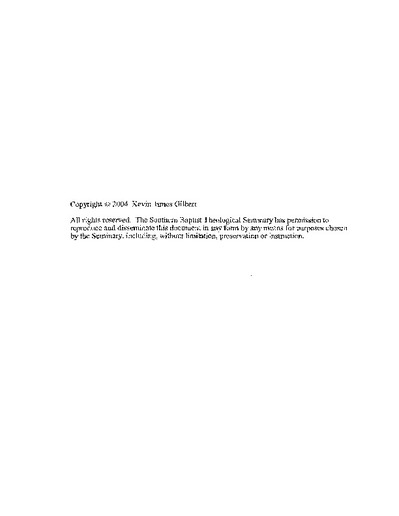| dc.contributor.advisor | Blaising, Craig A. | |
| dc.contributor.author | Gilbert, Kevin James | |
| dc.date.accessioned | 2009-12-08T19:02:25Z | |
| dc.date.available | 2009-12-08T19:02:25Z | |
| dc.date.created | 2004-05-14 | |
| dc.date.issued | 2004-05-14 | |
| dc.identifier.other | THESES Ph.D. .G374r | |
| dc.identifier.uri | http://hdl.handle.net.ezproxy.sbts.edu/10392/331 | |
| dc.description | This restricted item is available to students and faculty of the Southern Baptist Theological Seminary through the URI below. | |
| dc.description.abstract | This study argues that a key to continued unity in the Stone-Campbell movement in the face of T. W. Brents' unorthodox doctrine of limited foreknowledge was likely a consistent application of the rule of express terms. It focuses on the nineteenth century figure, T. W. Brents, who was found to have composed the movement's most comprehensive doctrine of limited foreknowledge. He serves as a representative of SCM leaders who confessed the doctrine in contrast with other key personalities who advocated a more classical doctrine.
The rule of express terms is described, as is its development and adoption into the movement as a means to fulfill the movement's agenda for unity. In theory, with particular regard to the boundaries of fellowship, it allowed ultimate spiritual authority to the express (explicit) terms of the Bible alone. It denied all but educational authority to human inferences or opinions. Most significantly, it negated the Reformed doctrine of necessary consequence. The theological history of Brents is sketched, to include factors available to influence the development of his doctrine of limited foreknowledge. Responses to his doctrine, both pro and con, are examined. The historical sources are united by a common thread of silence: no calls for the limitation of fellowship over this doctrine were discovered. Finally, the data are interpreted to demonstrate the likelihood of the thesis. The rule of express terms seems to be a key to continued unity in the movement amid theological diversity regarding the doctrine of divine foreknowledge. | en_US |
| dc.language.iso | en_US | en_US |
| dc.subject | Brents, T. W.--(Thomas Wesley),--1823-1905--Contributions in theology. | en_US |
| dc.subject | Bible--Evidences, authority, etc. | en_US |
| dc.subject | Restoration movement (Christianity) | en_US |
| dc.subject | God--Omniscience. | en_US |
| dc.title | The rule of express terms and the limits of fellowship in the Stone-Campbell movement: T. W. Brents, a test case | en_US |
| dc.type | Thesis | en_US |

